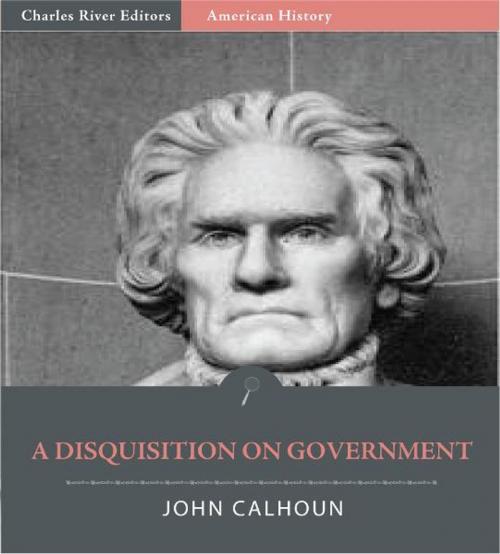A Disquisition on Government
Nonfiction, Social & Cultural Studies, Political Science, Government, Democracy, Politics, History & Theory| Author: | John C. Calhoun | ISBN: | 9781619826410 |
| Publisher: | Charles River Editors | Publication: | January 20, 2012 |
| Imprint: | Language: | English |
| Author: | John C. Calhoun |
| ISBN: | 9781619826410 |
| Publisher: | Charles River Editors |
| Publication: | January 20, 2012 |
| Imprint: | |
| Language: | English |
John Caldwell Calhoun (March 18, 1782 March 31, 1850) was a leading politician and political theorist from South Carolina during the first half of the 19th century. A powerful intellect, Calhoun eloquently spoke out on every issue of his day, but often changed positions. Calhoun began his political career as a nationalist and proponent of protective tariffs; later, he switched to states' rights, limited government, nullification and free trade. He is best known for his intense and original defense of slavery as a positive good, for his promotion of white people's rights, and for pointing the South toward secession from the Union. Devoted to the principle of liberty and fearful of corruption, Calhoun built his reputation as a political theorist by his redefinition of republicanism to include approval of slavery and minority rightswith the white South the minority in question. To protect minority rights against majority rule he called for a "concurrent majority" whereby the minority could sometimes block offensive proposals. Increasingly distrustful of democracy, he minimized the role of the Second Party System in South Carolina. Calhoun's defense of slavery became defunct, but his concept of concurrent majority, whereby a minority has the right to object to or even veto hostile legislation directed against it, has been incorporated into the American value system. Although Calhouns views are no longer considered popular in contemporary periods, in 1957, the United States Senates honored Calhoun as one of the "five greatest senators of all time." The Disquisition on Government was a book that incorporated Calhoun's views on government as seen from the point of view of the permanent minority (the South). Begun in 1843, and virtually finished in 1848, it elaborates the doctrine of his South Carolina Exposition and Protest. Its keynote is the idea of a concurrent majority. Simple majority government always results in despotism over the minority unless some way is devised to secure the assent of all classes, sections, and interests. The argument is close-knit and convincing if one accepts the belief of Calhoun that the states retain absolute sovereignty over the Constitution and can do with it as they wish. This doctrine could be made effective by nullification. But Calhoun believed that the clear recognition of rights on the part of the states on the one hand and of the national majority on the other would prevent matters ever coming to a crisis. South Carolina and other Southern states, in the three decades preceding the Civil War, had provided legislatures in which the vested interests of land and slaves dominated in the upper houses, while the popular will of the numerical majority prevailed in the lower houses. This was done in conscious acceptance of the doctrine of the Disquisition. This edition of Calhouns Disquisition is specially formatted with illustrations of the famous Senator.
John Caldwell Calhoun (March 18, 1782 March 31, 1850) was a leading politician and political theorist from South Carolina during the first half of the 19th century. A powerful intellect, Calhoun eloquently spoke out on every issue of his day, but often changed positions. Calhoun began his political career as a nationalist and proponent of protective tariffs; later, he switched to states' rights, limited government, nullification and free trade. He is best known for his intense and original defense of slavery as a positive good, for his promotion of white people's rights, and for pointing the South toward secession from the Union. Devoted to the principle of liberty and fearful of corruption, Calhoun built his reputation as a political theorist by his redefinition of republicanism to include approval of slavery and minority rightswith the white South the minority in question. To protect minority rights against majority rule he called for a "concurrent majority" whereby the minority could sometimes block offensive proposals. Increasingly distrustful of democracy, he minimized the role of the Second Party System in South Carolina. Calhoun's defense of slavery became defunct, but his concept of concurrent majority, whereby a minority has the right to object to or even veto hostile legislation directed against it, has been incorporated into the American value system. Although Calhouns views are no longer considered popular in contemporary periods, in 1957, the United States Senates honored Calhoun as one of the "five greatest senators of all time." The Disquisition on Government was a book that incorporated Calhoun's views on government as seen from the point of view of the permanent minority (the South). Begun in 1843, and virtually finished in 1848, it elaborates the doctrine of his South Carolina Exposition and Protest. Its keynote is the idea of a concurrent majority. Simple majority government always results in despotism over the minority unless some way is devised to secure the assent of all classes, sections, and interests. The argument is close-knit and convincing if one accepts the belief of Calhoun that the states retain absolute sovereignty over the Constitution and can do with it as they wish. This doctrine could be made effective by nullification. But Calhoun believed that the clear recognition of rights on the part of the states on the one hand and of the national majority on the other would prevent matters ever coming to a crisis. South Carolina and other Southern states, in the three decades preceding the Civil War, had provided legislatures in which the vested interests of land and slaves dominated in the upper houses, while the popular will of the numerical majority prevailed in the lower houses. This was done in conscious acceptance of the doctrine of the Disquisition. This edition of Calhouns Disquisition is specially formatted with illustrations of the famous Senator.















